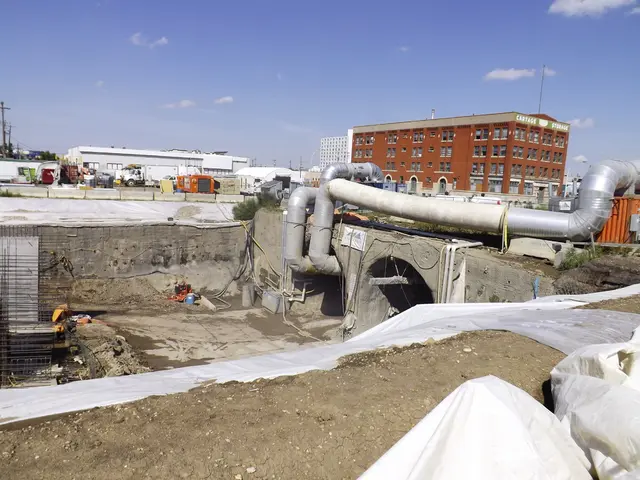Trump proposes a fresh strategy for Russian energy according to Von der Leyen
The European Union (EU) has announced an initiative to hasten the cessation of all European oil and gas imports from Russia, as the bloc grapples with the ongoing energy crisis.
According to European Commission President Ursula von der Leyen, the plan envisions that no gas will be imported from Russia into the community from 2028. This announcement comes as the EU seeks to reduce its dependence on Russian energy, which accounted for around 19 percent of all EU imports in 2024.
Despite significant reductions, around 13 million tons of Russian crude oil still reached the European market last year. Hungary and Slovakia were among the EU member states that still imported significant amounts of Russian oil, with the EU as a whole drastically reducing its dependence on Russian crude oil from about one third to approximately 3% of total oil imports.
However, the EU's efforts may face challenges due to the continued reliance on Russian energy by certain countries. Turkey, a NATO country, continues to import large amounts of energy from Russia, and the potential for resistance to quick changes in energy imports from Russia exists among certain EU member states and importing countries like Turkey.
The 19th package of EU-Russia sanctions, set to target Russia's banks, energy sector, and the use of cryptocurrencies to circumvent sanctions, may also play a role in the EU's efforts to end oil and gas imports from Russia. The United States may link further Russia sanctions to European partners imposing high tariffs on Chinese imports and ceasing Russian oil purchases.
The details for a faster exit from Russian fossil fuel imports were not provided by von der Leyen, and it is unclear if an EU initiative alone would be sufficient due to Turkey's large imports of cheap energy from Russia and lack of willingness to change quickly.
The EU's plan to accelerate the exit from Russian fossil fuel imports may encounter obstacles, but the impact of these initiatives on the oil and gas imports from Russia remains uncertain. Large amounts of liquefied natural gas from Russia are still being imported into the EU, and the conversation with US President Donald Trump was about further steps to increase economic pressure on Russia.
As the EU navigates these complex challenges, the initiative to end oil and gas imports from Russia marks a significant step towards energy independence and increased economic pressure on Russia. The success of this initiative will depend on the cooperation and commitment of all EU member states and importing countries to reduce their reliance on Russian energy.
Read also:
- Ben Jerry's co-founder departs in dispute concerned with Gaza conflict and corporate giant, Unilever
- Potential resistance encountered for Trump's nominee at the Federal Reserve
- United States Imposes Higher Tariffs Worldwide: Poland to Carry Financial Burden
- Struggling Europe Offers Guidance to Trump Prior to Alaska Encounter: Western Predicament Precedes Trump-Alaska Summit








